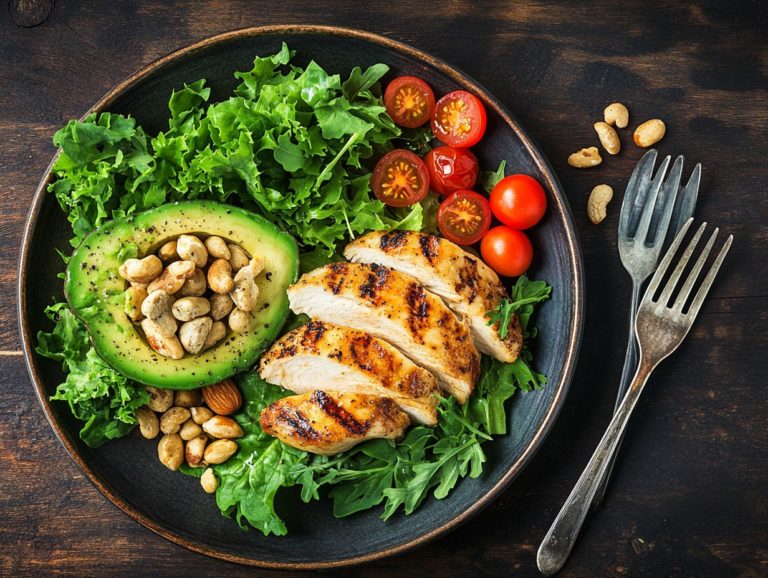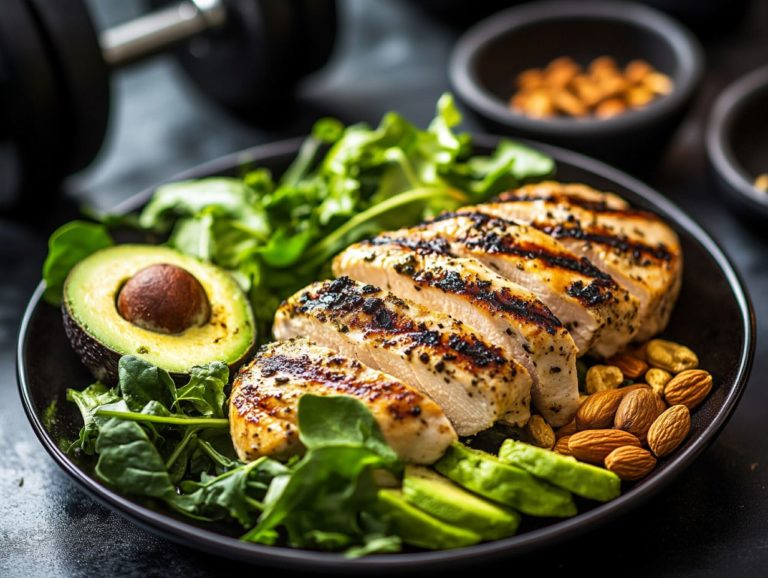Keto Diet and Pregnancy: Your Common Questions
Contents
- The Keto Diet and Pregnancy: Your Common Questions Answered
- Key Takeaways:
- What is the Keto Diet?
- How Does the Keto Diet Work?
- What Are the Keto Benefits?
- Is the Keto Diet Safe During Pregnancy?
- Can You Follow the Keto Diet While Breastfeeding?
- How Can You Modify the Keto Diet for Pregnancy?
- What Are Some Tips for Following the Keto Diet During Pregnancy?
- 3. Stay Hydrated
- 4. Monitor Your Nutrient Intake
- 5. Don’t Restrict Calories
- Frequently Asked Questions
- Can I follow a Keto diet during pregnancy?
- What are the potential risks of following a Keto diet during pregnancy?
- I am already on a Keto diet, should I stop if I become pregnant?
- Benefits of the Keto Diet During Pregnancy
- Can I Still Follow a Keto Diet While Breastfeeding?
- Healthy Alternatives to a Keto Diet During Pregnancy
The Keto Diet and Pregnancy: Your Common Questions Answered
The keto diet has surged in popularity due to its potential benefits, particularly for weight loss and enhanced health. The benefits of keto are widely recognized across various medical fields.
If you re pregnant or breastfeeding, you likely have specific concerns about the safety and efficacy of keto during these vital stages of life. Understanding keto considerations during pregnancy is essential for overall health.
This article delves into the essentials of the keto diet, explaining how it works and the advantages it may provide. Understanding keto nutrients and their roles is vital for maximizing these benefits.
It also addresses critical questions about keto safety during pregnancy and breastfeeding, offering essential tips for maintaining a balanced dietary approach.
Whether you re contemplating the keto lifestyle or adapting it for your pregnancy journey, you’ll find valuable insights here, including how to balance your ketogenic diet for a healthy pregnancy.
Key Takeaways:

- The keto diet can provide benefits during pregnancy, such as weight loss, improved insulin sensitivity, and reduced inflammation.
- Consult with a healthcare professional and modify the keto diet for pregnancy by increasing carbohydrate intake, focusing on nutrient-dense foods, and monitoring ketone levels.
- Listening to your body, staying hydrated, and not restricting calories are essential tips for safely following the keto diet during pregnancy and while breastfeeding.
What is the Keto Diet?
The keto diet, often called the keto diet, is a low-carbohydrate, high-fat dietary approach that induces a state of ketosis. In ketosis, your body shifts its primary fuel source from carbohydrates to fat, promoting effective fat burning and enhancing brain function.
This dietary strategy has garnered significant attention for its potential advantages, including weight loss, increased energy levels, and enhanced cognitive function. It has become a favored option among health enthusiasts.
How Does the Keto Diet Work?
The keto diet works by drastically cutting down your carbohydrate intake, steering your body into a metabolic state called ketosis. In this state, your body becomes exceptionally adept at burning fat for energy.
As your liver transforms fat into ketones, you gain an alternative energy source for your brain, leading to improved cognitive function and enhanced insulin sensitivity. Embracing this dietary shift can elevate your overall well-being and optimize your body’s performance.
What Are the Keto Benefits?
The keto diet presents an array of benefits, especially for those pursuing effective weight loss and enhanced metabolic health. Reducing your carb intake can lead to rapid and exciting weight loss as your body shifts into fat-burning mode.
This transformation can enhance your insulin sensitivity and decrease inflammation, positioning the keto diet as a potentially invaluable approach for managing various health conditions.
1. Weight Loss
One of the most celebrated perks of the keto diet is its remarkable ability to facilitate weight loss by encouraging your body to enter a state of ketosis. In this state, your body efficiently burns fat for energy instead of relying on carbohydrates.
This metabolic shift is crucial for appetite suppression; many people find they feel less hungry while following the diet. By promoting increased fat oxidation, the keto approach allows your body to utilize stored fat, effectively reducing your overall body fat percentage.
Those who have embraced this lifestyle often report rapid weight loss results, with some studies suggesting that it’s possible to shed up to 10% of your body weight within the first few weeks. The keto diet may also help normalize insulin levels, enhancing overall metabolic health.
Numerous success stories showcase individuals losing significant amounts of weight often over 30 pounds in just a few months, underscoring the potential effectiveness of this dietary strategy. Those with conditions like PCOS may find the keto diet particularly beneficial.
In conclusion, it’s vital to consult a healthcare professional before starting the keto diet, especially during pregnancy. Make informed dietary choices to ensure you and your baby remain healthy.
2. Improved Insulin Sensitivity
The ketogenic diet is renowned for its ability to enhance insulin sensitivity, making it particularly beneficial for those grappling with insulin resistance or type 2 diabetes. By effectively regulating blood sugar levels, this approach can significantly improve your overall health.
When you drastically reduce carbohydrate intake, your body is prompted to shift gears and use fats as its primary energy source. This transition leads to lower insulin levels. It also enhances your responsiveness to this vital hormone. This change helps manage diabetes more effectively. It also offers a proactive strategy for pregnant women concerned about gestational diabetes. This approach aligns closely with the principles of the Atkins diet and the South Beach diet, which also emphasize low-carb intake.
With improved glucose metabolism, the chances of encountering insulin-related complications during pregnancy diminish. This benefits both you and your child. Embracing this dietary strategy can serve as a preventive measure, promoting not just your health but also your metabolic well-being.
3. Reduced Inflammation
One of the remarkable benefits of the keto diet lies in its potential to reduce inflammation. This factor can significantly enhance your overall health and may even support a healthy pregnancy by effectively managing inflammatory responses within your body.
This dietary approach centers on lowering carbohydrate intake while elevating fat consumption. This leads to the production of ketones, which are known for their anti-inflammatory properties. Switching your body s energy source from glucose to fat can lower inflammatory markers. This change improves your health outcomes.
Incorporating omega-3 fatty acids, commonly found in fatty fish and flaxseeds, can amplify the anti-inflammatory effects of the keto diet. These beneficial fats work in harmony to combat inflammation, making this dietary strategy even more powerful for those seeking to enhance their overall well-being. For example, Laura Dority, a dietitian at the Medical University of South Carolina, emphasizes the importance of including healthy fats in a ketogenic approach.
Is the Keto Diet Safe During Pregnancy?

The safety of following the keto diet during pregnancy remains a topic of considerable debate. It raises important questions about the nutritional needs of expectant mothers and the potential effects on fetal development and pregnancy weight management.
While some experts suggest that a carefully crafted ketogenic diet may be safe and even advantageous, it is crucial for you to approach this diet with caution and seek professional guidance.
What Are the Risks of Following the Keto Diet During Pregnancy?
Following the keto diet during pregnancy can come with certain risks, especially if your nutritional needs aren’t adequately met. This oversight could lead to negative outcomes for both fetal development and your health.
As an expectant mother, you may encounter challenges like a lack of important nutrients, particularly in essential vitamins and minerals that are vital for your well-being and the healthy growth of your baby. These deficiencies can hinder fetal growth and lead to complications during pregnancy.
Managing weight on a low-carbohydrate diet can also be tricky. Excessive weight loss might not align with the nutritional requirements you need during this critical period. Therefore, if you’re considering the keto diet while pregnant, it s crucial to consult with healthcare professionals who can offer tailored guidance. This will ensure that both you and your baby receive the necessary nutrients for a healthy pregnancy, addressing potential keto risks. Don’t take chances with your health or your baby’s consult a healthcare professional today for the best prenatal advice!
Can You Follow the Keto Diet While Breastfeeding?
The question of whether you can follow the keto diet while breastfeeding is quite complex. It necessitates a careful balancing act to ensure that both your nutritional needs and those of your baby are effectively met. Proper ketogenic nutrition is essential to avoid potential issues.
Are There Any Risks for the Baby if You Follow the Keto Diet While Breastfeeding?
If you re considering the keto diet while breastfeeding, it s important to be aware of the potential risks for your baby. The primary concern lies in the possibility of insufficient nutritional intake or an imbalanced macronutrient distribution, which could affect the composition of your milk.
This imbalance might lead to inadequate transfer of vital nutrients that are essential for your baby s growth and development. Nutrients like calcium and vitamin D could be compromised if your diet is excessively low in carbohydrates, potentially impacting your baby’s bone health and overall well-being.
Moreover, the high-fat nature of the ketogenic diet may alter the fatty acid profile of your breast milk, which could have implications for your infant’s brain development and immune function. Therefore, it’s crucial for breastfeeding mothers on a high-fat diet to closely monitor their nutrient intake and consult healthcare professionals.
This way, you can ensure that you re not inadvertently putting your child’s health at risk during this critical stage of growth.
How Can You Modify the Keto Diet for Pregnancy?
Modifying the keto diet during pregnancy is essential for ensuring that both you and your baby receive the necessary nutrients for healthy development. This may require you to increase your carbohydrate intake and prioritize nutrient-dense foods, creating a balanced approach that supports both your well-being and that of your growing child. Additionally, make sure to consider the ketogenic approach carefully to maintain optimal nutritional balance.
1. Increase Carbohydrate Intake for Keto Health
One essential adjustment for pregnant women on the keto diet is to elevate carbohydrate intake in order to meet the increased nutritional demands of both mother and child. This ensures you maintain adequate energy levels and nutrient availability, considering the keto effects on your body.
By incorporating healthy carbohydrate sources, such as nutrient-dense fruits and whole grains, you can supply vital vitamins and minerals, including crucial vitamin D and folic acid, that support fetal development while still keeping within your low-carb framework. This thoughtful approach not only fosters stable energy levels throughout your day but also helps mitigate common pregnancy-related challenges like fatigue and constipation.
Finding the right balance is critical for anyone adhering to a keto regimen; the appropriate types of carbohydrates can significantly enhance overall well-being during this transformative period.
2. Focus on Nutrient-Dense Foods
Focusing on nutrient-dense foods is essential for you as a pregnant woman following a modified keto diet, as these foods provide the necessary vitamins and minerals crucial for a healthy pregnancy and fetal development.
Leafy greens, like spinach and kale, are rich in folate, which is vital for preventing neural tube defects. Avocados, packed with healthy fats, not only help with the absorption of fat-soluble vitamins but also offer potassium, which can assist in managing blood pressure. It’s important to include sources of omega-3 fatty acids as well, to support overall health.
Nuts and seeds, such as almonds and chia seeds, are fantastic sources of omega-3 fatty acids and essential minerals like magnesium and zinc, supporting both your health and your baby’s growth. By incorporating these nutrient-dense options into your diet, you can effectively meet your increased nutritional needs while enjoying a diverse and satisfying array of foods.
3. Monitor Ketone Levels

Monitoring your ketone levels is a vital practice if you’re a pregnant woman following the keto diet. It helps you ensure that you stay within a safe range, supporting your overall health throughout your pregnancy.
By familiarizing yourself with various methods to measure these ketone levels such as urine strips, blood meters, or breath analyzers you can gain valuable insights into your body’s metabolism. Ideally, during pregnancy, your ketone levels should hover between 0.5 to 3.0 mmol/L to avoid complications like ketoacidosis, which can pose serious risks.
Regularly checking your ketone levels lets you adjust your diet on the spot! This ensures you and your baby get all the essential nutrients you need. This active approach is crucial in preventing potential complications while embracing a ketogenic lifestyle, ultimately leading to a healthier pregnancy journey.
What Are Some Tips for Following the Keto Diet During Pregnancy?
Navigating the keto diet during pregnancy can be quite a challenge, yet by following a few key tips, you can create a balanced approach that effectively meets both your needs and those of your baby.
It’s crucial to consult with healthcare professionals and pay close attention to the signals your body sends you. This way, you can embrace the journey with confidence and care.
1. Consult with a Healthcare Professional
Consulting with a healthcare professional is an essential step for you if you’re a pregnant woman considering the keto diet. Experts like Laura Dority from the Medical University of South Carolina can offer personalized guidance to ensure that this dietary approach aligns with your unique health needs.
This consideration becomes even more critical if you have underlying medical conditions like polycystic ovary syndrome (PCOS) or gestational diabetes, as the ketogenic diet can impact your blood sugar levels and overall metabolic health.
These professionals can assess whether a low-carb, high-fat regimen is safe and beneficial during your pregnancy, taking into account both your health and that of your developing baby. They will advise you on essential nutrient intake, ensuring that your diet supports a healthy pregnancy while addressing any specific concerns you may have.
With tailored dietary recommendations, you can effectively mitigate risks and promote wellness for both yourself and your child.
2. Listen to Your Body
Listening to your body is essential while navigating the keto diet during pregnancy. This approach enables you to respond effectively to your hunger cues and nutritional needs, ensuring the well-being of both you and your baby.
As you experience a multitude of physical changes and emotional shifts, it becomes crucial to stay attuned to your unique nutritional requirements. Your cravings can be valuable signals, indicating what your body might be lacking be it essential vitamins or minerals.
Fluctuations in your energy levels can guide your dietary choices, emphasizing the importance of nutrient-dense foods and proper hydration. By actively tuning in to these signals, you can make informed dietary adjustments that support your health and contribute to your baby s healthy development. It s all about fostering a deeper connection with your body to create a balanced and nourishing pregnancy experience.
3. Stay Hydrated
Staying hydrated is absolutely essential for you as a pregnant woman on the keto diet. Proper hydration not only supports your overall health but also aids digestion and ensures your body functions optimally throughout this incredible journey.
Maintaining adequate fluid intake is crucial for both your well-being and that of your growing baby. Hydration goes beyond simply quenching your thirst; it helps regulate your body temperature, lubricate your joints, and facilitate the transport of vital nutrients to your little one. Proper hydration, along with balanced nutrient intake including vitamin D, is essential for a healthy pregnancy.
You should prioritize beverages rich in electrolytes and nutrients think water, herbal teas, and nourishing broths while keeping sugary drinks and excessive caffeine to a minimum. By staying properly hydrated, you can help prevent complications such as constipation and urinary tract infections, all while supporting the amniotic fluid levels that are essential for your baby’s development. Make hydration a priority; it s essential for both you and your little one s well-being!
Ultimately, mindful hydration practices greatly enhance your journey of nurturing new life.
4. Monitor Your Nutrient Intake
Monitoring nutrient intake is paramount for you as a pregnant woman on the keto diet, ensuring you receive the essential vitamins and minerals vital for fetal growth and your overall health.
To effectively track your nutrient consumption, consider utilizing food diaries or mobile applications specifically designed for dietary management. These tools not only help you record your daily food intake but also provide valuable insights into how nutritious your food is, allowing you to pinpoint any gaps in essential vitamins like folic acid and key minerals such as calcium.
By adopting this structured approach, you can confidently meet your nutritional requirements, supporting your baby’s development while staying true to your dietary preferences. Prioritizing balanced nutrition during this critical period can have a profound impact on both your health and that of your baby.
5. Don’t Restrict Calories
During pregnancy, it s essential that you don t restrict calories while following the keto diet. Adequate caloric intake is crucial to support the growing needs of both you and your baby.
As an expectant mother, focusing on a well-rounded intake that meets your energy requirements is vital, promoting healthy fetal development and your well-being. Maintaining a balanced approach to the main types of nutrients your body needs carbohydrates, proteins, and fats ensures you re including the essential vitamins and minerals your body needs. This balanced approach aligns with dietary strategies from various plans such as the Atkins diet and the South Beach diet.
By prioritizing wholesome, nutrient-dense foods and consulting with healthcare professionals, you can strike that delicate balance. This way, you can enjoy the benefits of a keto lifestyle while meeting the heightened nutritional demands of this transformative period, ultimately creating a nurturing environment for your little one to thrive.
Frequently Asked Questions

Can I follow a Keto diet during pregnancy?
It is generally not recommended to follow a Keto diet during pregnancy due to the potential risks to both the mother and baby. Consult with your healthcare provider before making any significant dietary changes during pregnancy.
What are the potential risks of following a Keto diet during pregnancy?
Following a Keto diet during pregnancy can increase the risk of complications such as nutrient deficiencies, low birth weight, and birth defects. Maintaining a balanced and nutritious diet is crucial for you and your baby s health!
I am already on a Keto diet, should I stop if I become pregnant?
If you are already following a Keto diet and become pregnant, it is best to consult with your healthcare provider. They can help you make an informed decision about whether to continue the diet or make necessary adjustments to ensure the health of both you and your baby.
In conclusion, prioritizing your health during pregnancy is essential. Always consult with your healthcare provider for personalized advice and support.
Benefits of the Keto Diet During Pregnancy
There is limited research on the effects of following a Keto diet during pregnancy. Some women report feeling more energetic and experiencing less morning sickness while on a Keto or low-carb diet.
However, it s essential to prioritize the safety and health of both the mother and baby during this critical time. Omega-3 and vitamin D are essential nutrients during this time.
Can I Still Follow a Keto Diet While Breastfeeding?
It is generally not recommended to follow a Keto diet while breastfeeding. This is due to the potential transfer of ketones to the baby through breast milk.
Alternative diets such as the Atkins diet or the South Beach diet may also have implications. Always check with your healthcare provider to ensure your choices are safe and right for you!
Healthy Alternatives to a Keto Diet During Pregnancy
Some healthy alternatives to a Keto diet during pregnancy include a balanced and varied diet. This should consist of a variety of whole foods such as fruits, vegetables, whole grains, lean proteins, and healthy fats.
For those with conditions like PCOS, it is particularly important to consult with professionals such as Laura Dority for personalized and safe dietary recommendations during pregnancy. Act now to ensure both you and your baby stay healthy during this crucial time!






